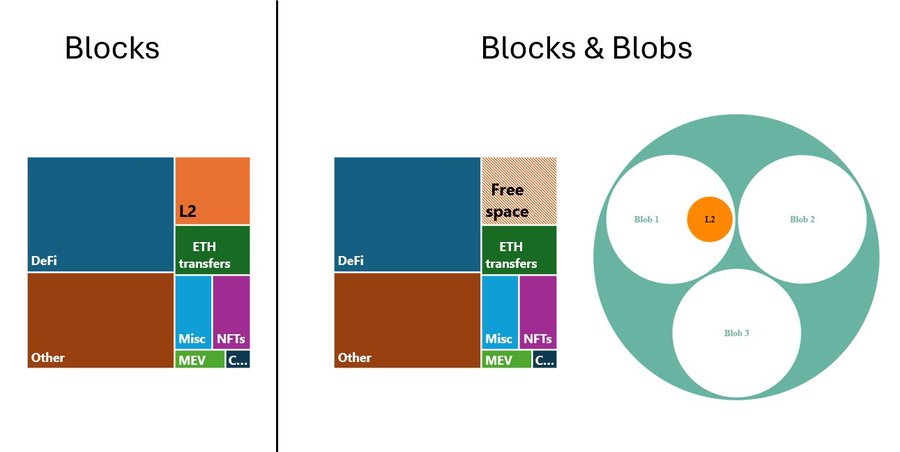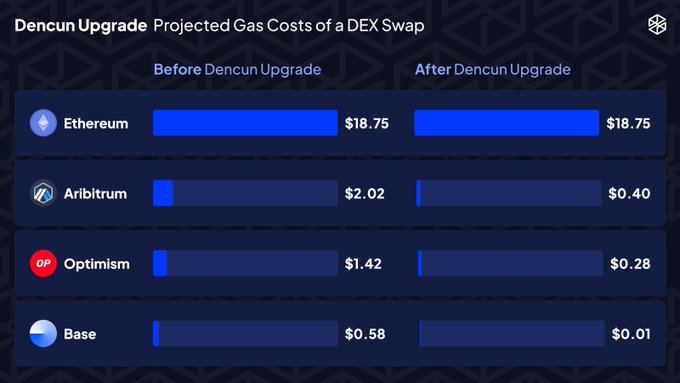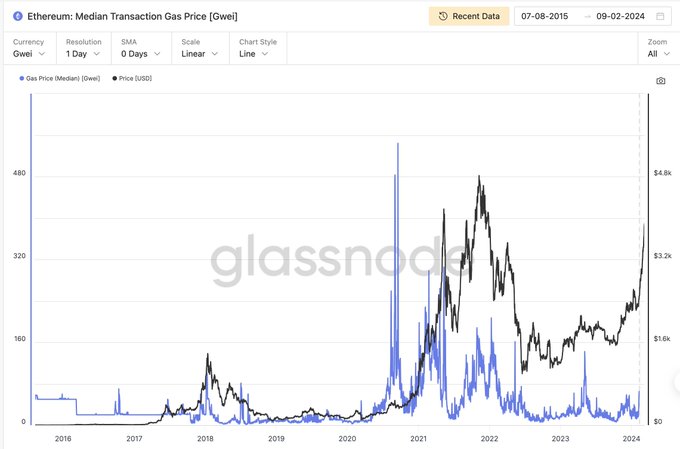- Dencun marks a crucial upgrade for Ethereum, aiming to improve scalability and reduce transaction costs in secondary layers.
- EIP-7044 and EIP-7045 extend the validity of exits and the time for attestations, strengthening security in the Ethereum network.
With the Ethereum Merge, an era was ushered in where secondary layer transactions become extremely affordable in cost, leading to a massive preference for these networks for Ethereum activities. There are even initiatives that cover gas costs that are normally borne by users, proving more economical than investing in advertising.

Dencun is named after the union of Deneb, an update at the Consensus Layer, and Cancun, at the Execution Layer, seeking to optimize network performance and user experience. This development is crucial because of its promise to significantly increase network scalability. It incorporates EIP-4844, known as proto-dank sharding, which enables blob transactions, reducing costs for Layer 2 chains and facilitating massive scalability through Layer 2 rollups by lowering data availability costs .
Unlike publishing data to Ethereum’s Calldata, Layer 2 transactions will be included in blobs. This method is anticipated to lower rollup costs by up to 90%, as they will avoid publishing data directly to Ethereum blobs, which is more costly. This advancement represents a marked improvement in cost efficiency and scalability for applications on the Ethereum mainnet.
After the Ethereum Dencun upgrade this week, EIP-4844 will reduce L2 gas fees. According to IntoTheBlock statistics, for a DEX swap, the gas fee for Aribitrum will be reduced from $2.02 to $0.4, Optimism will be reduced from $1.42 to $0.28, Base will be reduced from $0.58 to… pic.twitter.com/0x6jGDYF5z
— Wu Blockchain (@WuBlockchain) March 11, 2024
Dencun stands to be the most relevant update for Ethereum since the Merge in September 2022, which changed the network algorithm from proof-of-work to staking. In addition, Dencun aligns with Ethereum’s ultimate goal of supporting hundreds of rollups and secondary scaling layers, and in the future, processing millions of transactions per second, as we detailed in ETHNews.

This upgrade will bring Proto-Danksharding, a widely discussed concept that modifies data storage in Ethereum. Instead of keeping all data directly in Ethereum’s immutable execution layer, Dencun will implement a new and less expensive way to store temporary blocks of data. While the term “blobs” may seem informal, it is an established concept in computer science, present in languages such as JavaScript and Python.
The EIP-7044 introduces an innovation
output messages will be valid indefinitely, eliminating the need for constant updates and ensuring a smoother retirement process. This EIP is especially useful in contexts where staking operators and fund owners differ, making it easier for exit requests to remain valid without the need for frequent renewals.
EIP-7045 extends the deadline for including attestations, giving validators additional time to integrate their attestations into a block, thus strengthening the security and stability of Ethereum’s Proof-of-Stake (PoS) consensus mechanism.
EIP-7514 proposes to regulate the addition of new validators to the Ethereum network, setting a steady increase by limiting the entry of new validators to eight per epoch. This method seeks to keep the network efficient, especially in the face of a large number of people interested in staking their ETH.
Layer 2 rollups, the main beneficiaries of proto-danksharding, will be able to use data blocks to pool transactions more economically, reducing operational costs and improving scalability.
Dencun will incorporate core Ethereum Improvement Proposals (EIPs) in addition to those already mentioned:
- EIP-1153 introduces the concept of transient storage in Ethereum, which allows storage to be used only for the duration of a transaction. This mechanism promotes more efficient smart contract designs, generates considerable gas savings and contributes to a simplification in the EVM structure.
- EIP-4788 will decrease the need for trust assumptions for applications on the mainnet that need data about Ethereum’s consensus state to operate properly, as is the case for liquid staking protocols and re-staking applications. This aspect becomes relevant due to the growing interest in the liquid staking sector.
- EIP-7044 optimizes the staking output process by making pre-signed output messages permanently valid.
- The EIP-7045 extends the interval in which validators can issue attestations, resulting in faster block confirmation.
- EIP-5656 introduces the MCOPY opcode to streamline and economize processes, improving the efficiency of smart contracts.
- EIP-6780 adjusts the use of the SELFDESTRUCT opcode. Originally intended to incentivize the elimination of states in the chain, this opcode has presented more drawbacks than advantages. EIP-6780 will restrict its use to particular situations.
- EIP-7514 caps the per-epoch change limit at 8, transforming the growth of Ethereum validators from an exponential to a linear model. This measure seeks to control the increase in the set of validators, avoiding network state overload.
- EIP-7516 introduces the BLOBBASEFEE opcode, which allows rollups and layer 2 to query the base cost of blobs in a cost-effective way, using only 2 gas units, from the block header.

It is estimated that Dencun could reduce rates on secondary layers by an order of magnitude, meaning that the cost could drop by as much as tenfold. This change is optimistically expected, although its actual implementation and benefits will vary depending on each network’s readiness to adopt the use of blobs.
With respect to transactions on the Ethereum network, the impact is expected to be minimal
The main difference will be the exclusion of rollups from the standard block space, which could exert a positive influence on gas prices. In addition, Dencun includes other optimizations that will allow some transactions to be carried out more economically, although these adjustments will mainly apply at the smart contract level, as in the case of future versions of Uniswap.
The Dencun update seeks to boost Ethereum’s efficiency, making it more attractive to developers, builders and investors by optimizing transaction efficiency and reducing costs.



